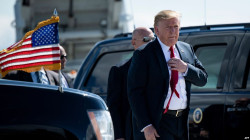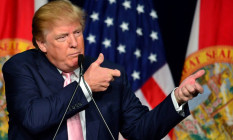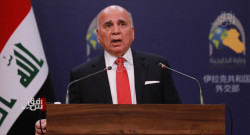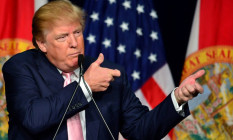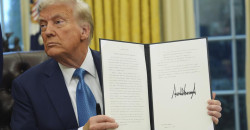USAID's fall, Iraq's call, losses appal
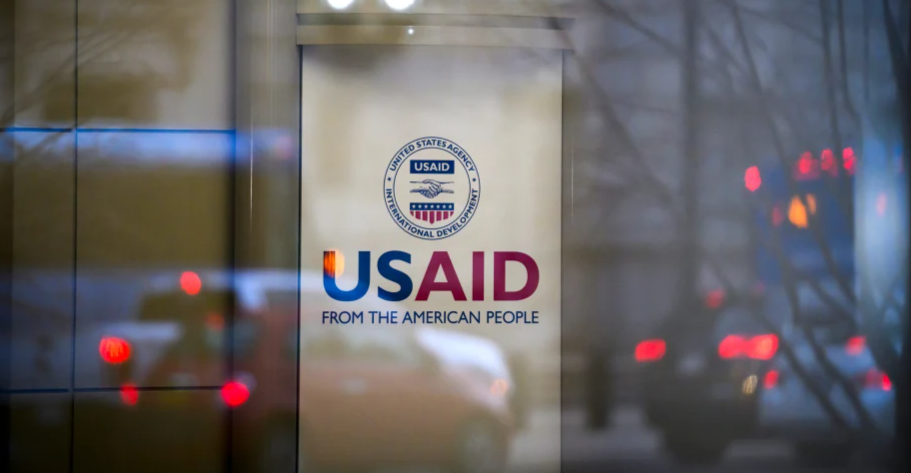
Shafaq News/ Iraq’s civil society is on the brink of collapse. With the US abruptly freezing foreign aid, organizations that have long provided humanitarian and economic services now face an existential crisis.
Nearly 90% of them could shut down within two years, leaving millions without support and threatening progress in key sectors.
The decision, one of President Donald Trump’s first executive orders in 2025, suspends all foreign assistance for a 90-day review, sending shockwaves through Iraq’s non-profit sector and raising urgent questions about the country’s future stability.
The Trump administration’s decision to dismantle USAID at the start of 2025 marks a significant departure from previous US foreign aid priorities. Led by the Department of Government Efficiency (DOGE) under Elon Musk, the move aimed to slash federal expenditures, with a federal court upholding the cost-cutting measures. As a result, the State Department announced the closure, shifting oversight of the remaining 17% of USAID programs—approximately 1,000 initiatives—to its purview.
This shift follows the Biden administration’s earlier plan to allocate $42.8 billion to foreign aid, with USAID managing $28.3 billion. However, the Trump administration swiftly reversed course, canceling over 5,300 grants and contracts worth more than $27 billion. Secretary of State Marco Rubio defended the decision, asserting that the majority of programs had misallocated funds or failed to serve US interests.
Critics warn that dismantling USAID would reduce America’s global aid footprint while competitors like China expand theirs is a strategic misstep.
USAID in Iraq
Established in 1961 by President John F. Kennedy, USAID serves as the primary channel for US foreign aid. Officially promoted as a tool for international economic growth, food security, and human rights, many experts view USAID as a soft power instrument advancing US interests.
Operating in over 100 countries, USAID allocated nearly $ 28.3 billion in 2025, funding reconstruction in Afghanistan, health and food security programs in Ethiopia, and disaster relief in Haiti.
As detailed in the agency's official yearly reports, Iraq has received more than $9.3 billion in assistance from USAID since 2003. This support spans multiple sectors and drives long-term development.
Of this amount, over $1.3 billion has been allocated to humanitarian aid, benefiting vulnerable populations.
USAID has also contributed to rebuilding critical infrastructure, providing more than $405 million to the United Nations Development Programme’s Funding Facility for Stabilization (FFS). This initiative has supported reconstructions in Mosul, al-Ramadi, and Tikrit, restoring essential public services and facilities.
Economic development has been another key focus, with $140 million invested in fostering entrepreneurship, job creation, and women’s empowerment. These efforts have benefited more than 15,000 small and medium-sized enterprises (SMEs) and provided vocational training to over 75,000 Iraqis.
Governance programs have also received over $250 million to strengthen institutions, enhance transparency, and improve local administration. Additionally, infrastructure projects have played a role in recovery efforts, with the restoration of 1,500 schools, 100 health clinics, and 500 water and sanitation facilities in Mosul.
In Sinjar, over 30,000 Yazidis have gained access to essential services, contributing to stability in the area.
Meanwhile, in al-Anbar, USAID has worked with the Iraqi government to provide clean water to 1.4 million residents in al-Ramadi and Fallujah. Further investments include a $20 million initiative launched in 2024 to improve water and sanitation services across five provinces—Maysan, al-Diwaniya, Nineveh, Baghdad, and Erbil—benefiting 2.5 million people.
It Can Be Painful
The reduction in USAID funding came with immediate repercussions. With financial resources diminishing, millions of displaced Iraqis, particularly in Nineveh, al-Anbar, and Saladin, could face increased food insecurity, limited medical access, and deteriorating sanitation conditions.
The agricultural sector, previously supported by USAID initiatives, may experience setbacks, impacting livelihoods and food production. Economic momentum could also slow as job training and entrepreneurship programs come to an end.
Beyond economic and humanitarian concerns, the funding cut raises security considerations. Some analysts caution that instability in former ISIS strongholds could create vulnerabilities, while community reintegration efforts and programs promoting social cohesion may be affected.
Iraq’s civil society organizations are also facing challenges. Zainab Ali Shbar, a researcher at the Information Center for Research and Development, noted the potential impact, “The US funding has supported vital programs. Without this financial support, many organizations have been forced to downsize, leading to rising unemployment, while others are preparing to close. It’s estimated that 90% of these organizations will shut down within two years.”
Although some European funding remains available, it does not fully compensate for the US withdrawal. Insam Salman, head of the human rights and sustainable development organization Aysan, stated, “American funding accounts for about 60% of Iraq’s incoming support. Without it, many critical development programs will cease, stalling Iraq’s progress and undermining years of work in various sectors.”
The funding cuts also pose challenges for key UN development programs, particularly those supporting the Iraqi Ministry of Migration and Displacement. Initiatives aimed at repatriating Iraqi families from northern Syria and sustaining operations in camps such as al-Jadaa and al-Hol may face financial strain.
Ali Al-Jahakir, spokesperson for the ministry, commented, “Most of the projects that have been halted are rehabilitation programs funded by the US government. While some NGOs continue with EU grants, the suspended projects are not essential and can be replaced with alternative funding.”
Independence is Strength
As Iraq navigates the suspension of US aid to international organizations, officials are actively exploring alternative funding sources while reinforcing the role of the Ministry of Migration in managing humanitarian initiatives.
Following a meeting on March 13, the National Security Advisory and key ministries urged the United States to reconsider its decision, emphasizing the importance of continued support for humanitarian efforts.
However, Alaa Al-Moussawi, vice president of the Iraq Youth Center for Studies and Training, underscored the potential benefits of self-reliance. She advocated for a stronger emphasis on state-supported organizations, arguing that domestic funding would help ensure civil society initiatives remain aligned with national priorities.
“When funding comes from the state, organizations work for the country, ensuring loyalty to Iraq,” Al-Moussawi stated. “Every funding source, whether domestic or foreign, has its own objectives. While external funding may seem beneficial, it often does not prioritize Iraq’s interests above those of its backers.”
In response to the funding gap, Iraq is also intensifying its efforts to secure alternative funds.
One key strategy has been bolstering partnerships with international donors, particularly the European Union, which has been a major financial backer since 2003.
The EU has provided over €1.2 billion in development aid to Iraq and remains a crucial player in stabilizing the country. Currently, the bloc is funding projects worth €510 million across governance, education, and infrastructure.
In 2024, a €47.5 million initiative targeted recovery efforts in Basra, Nineveh, and Erbil, supporting employment programs and improving public services.
Japan has also played a pivotal role in Iraq’s reconstruction. Through the Japan International Cooperation Agency (JICA), Tokyo has injected nearly $11 billion in official development loans, primarily supporting electricity, healthcare, and water management. These funds have significantly contributed to rehabilitating power grids, expanding hospitals, and revitalizing irrigation projects.
In late 2024, JICA renewed its cooperation with the United Nations Development Programme (UNDP) to accelerate economic recovery efforts, with a focus on job creation and sustainable growth.
Meanwhile, the United Kingdom has deepened its engagement in Iraq’s infrastructure and energy sectors. In early 2025, London finalized a $15 billion agreement with Baghdad, which includes a large-scale water infrastructure project aimed at improving access to clean drinking water in southern and western Iraq.
The deal also encompasses significant investments in modernizing Iraq’s power transmission systems, a crucial step toward addressing chronic electricity shortages.
Apart from the government-backed initiatives, Iraq has turned to international organizations and NGOs to bridge the funding shortfall. The United Nations Development Programme remains a key partner, working across multiple sectors to sustain economic diversification, support governance reforms, and promote climate resilience.
Additionally, global humanitarian groups such as ‘’Unlock Aid’’, ‘’Founders Pledge’’, and ‘’The Life You Can Save’’ have launched emergency fundraising campaigns to offset some of the losses caused by the USAID suspension.
While these efforts have helped mitigate the immediate impact, they still fall short of replacing the scale of American funding.
